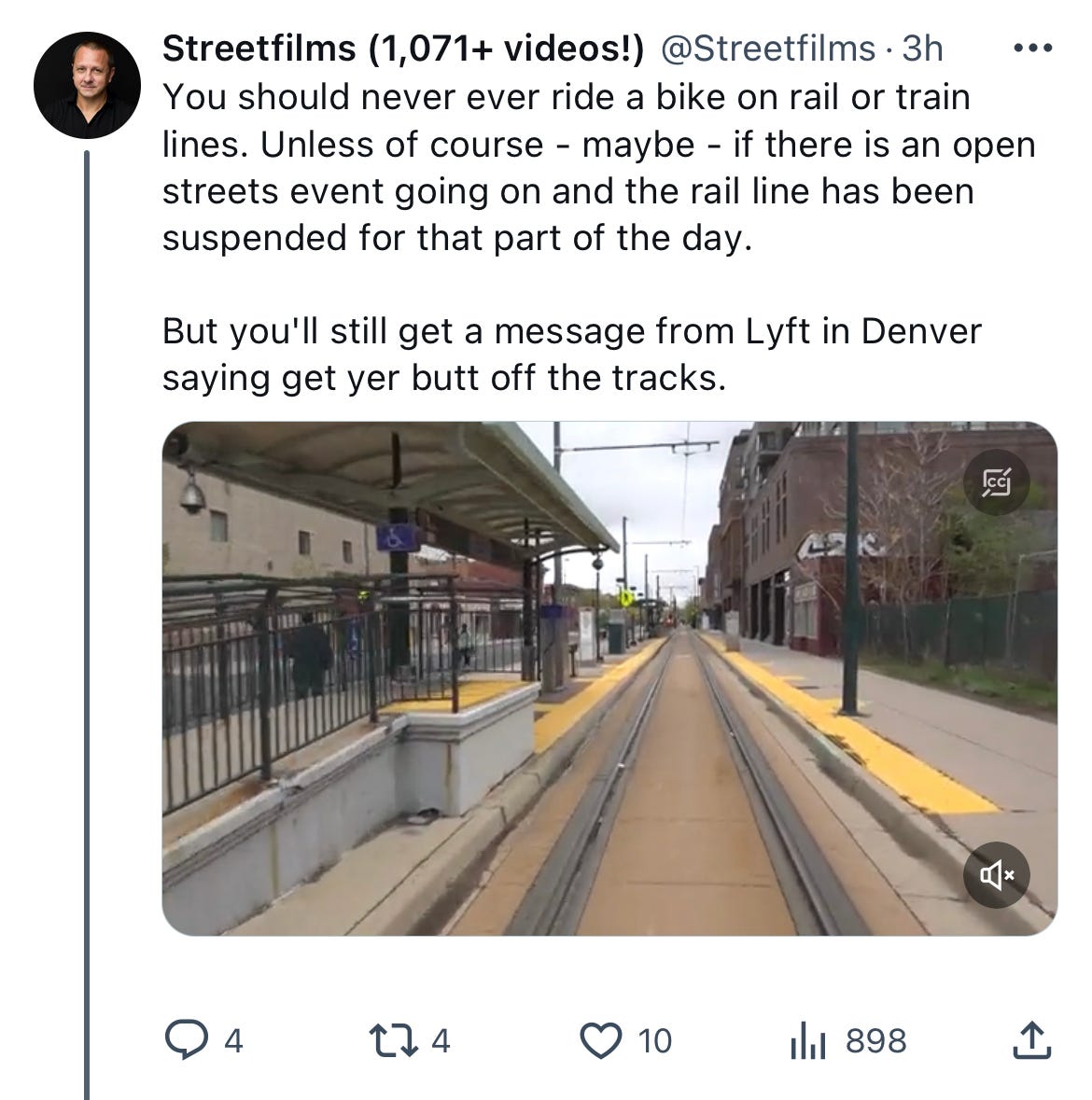Number one rule of firearm safety is to assume anything shaped like a gun is loaded until you confirm otherwise. Assume that anyone else, especially a poorly-trained and qualified-immunity-protected cop is going to f**k up and see any item in your hands as looking like a gun.
Cypherpunks often warn of running computer programs that are not verified by the PGP keys of the original developers, “don’t trust, verify.”
A whole separate blog post could be written alone around the theme of “don’t trust, verify,” given the horrific track record of government bureaucrats and their worshippers in the space of bicycling.
But this is about trains.
Similar rules-of-thumb apply to railroad tracks when traveling along their right of way or crossing them: assume a train is coming until you can confirm otherwise.
Trains are quiet these days and that includes heavier trains such as those used for freight and heavy transit. The era of the loud“choo choo” is largely over. Trains which use rubber tires are even quieter, but they’re typically used in underground that use a third rail which require a bit more effort to access.
Speaking of third rail…

This takes us to poor Denver, the unfortunate target of this year’s NACTO Conference Grifter-Orgy (primary sponsors were three separate taxpayer-funded government bureaucracies: City of Denver, CDOT, and RTD) which of course was “covered” by the propaganda arm of the goons who sold out cycling safety to other useless goons who do next to nothing productive with the theft of hundreds of millions in dollars of taxpayer money each year. (NYC-based NACTO are a groups who regularly denies elementary traffic safety concepts in their “designs” for bicyclists.)
And speaking of NYC, Mark Gordon’s Streetsblog and video propagandist Streetfilms was there covering the event with sage advice.
Whether this occurred during a so-called “Open Streets” event which coincided with temporary suspension of rail service or not, this “advice” is profoundly stupid.
Full stop.
No, on should never ride along “rail or train lines” (what is the difference?) period.
This is the type of advice only someone in what Christopher Lasch reffered to “the thinking class” would provide. From his book, The Revolt of the Elites:
“The thinking classes are fatally removed from the physical side of life… Their only relation to productive labor is that of consumers. They have no experience of making anything substantial or enduring. They live in a world of abstractions and images, a simulated world that consists of computerized models of reality – “hyperreality,” as it’s been called – as distinguished from the palatable, immediate, physical reality inhabited by ordinary men and women. Their belief in “social construction of reality” – the central dogma of postmodernist thought – reflects the experience of living in an artificial environment from which everything that resists human control (unavoidably, everything familiar and reassuring as well) has been rigorously excluded. Control has become their obsession. In their drive to insulate themselves against risk and contingency – against the unpredictable hazards that afflict human life – the thinking classes have seceded not just from the common world around them but from reality itself.”
Taking such rail safety advice is about a dumb as taking advice on firearm safety from this guy.
The geographical restrictions on Lyft scooters and similar devices are intended to discourage users not only from doing stunts such as this but also from parking them in prohibited and often unsafe areas.
Lyft (another one of the sponsors of the NACTO conference and big backer of the Streetsfilm/blog menace) isn’t going to temporarily modify this system for a one time event that only lasts a brief time either.
Other than that, railroads, despite having a better operational safety record than other fields, has problems of their own elevating (because this is talking about Colorado) the need for a “don’t trust, verify” type model.
The Denver area’s Regional Transit District otherwise known as RTD, who operates the region’s train and public transit system has a record of safety issues some of of which led to threats from Federal Regulators to shut down the problematic lines until the issues were fixed.
A detailed investigation by CPR in 2018 as a result of “after months of dead-end public records requests” revealed several startling items.
Interviews with three former engineers, and with two current engineers who spoke on the condition of anonymity, suggest many of the decertifications are due to a few major factors: the lines’ design, a constant push to remain on time, tired operators, and low wages that contribute to high employee turnover and, subsequently, inexperienced engineers.
“You're worried about kids running to put rocks on the rails,” said one current engineer. “Kids running in front of you on bicycles, cars, everything. And you’ll lose focus because you've got so much going on.”
The article continues.
One incident happened on June 19, 2016, after former operator Jeffrey Brannon left Denver International Airport for Union Station. Along the way, he said his positive train control system malfunctioned.
Positive train control is a high-tech safety system now mandated by federal law. Many railroads across the country have struggled to implement the new system. RTD has long trumpeted the A and B lines for being the first commuter rail lines in the country to integrate a PTC system into its construction. That system had a rocky start though, including with the PTC-controlled wireless crossing gates that led to flaggers being stationed at each at-grade crossing for the past two years.
Brannon said when his PTC system started acting up, the dispatcher told him to turn it off. He was supposed to switch to a different train when he got to Union Station. But once he arrived, a new train wasn’t ready. So he made his return trip to the airport in the train without PTC.
Everything was going smoothly on Brannon’s return run until he hit a phase break, a designed dead zone between power stations that trains are supposed to coast through. Management told operators not even to brake in phase breaks, Brannon and other engineers say, because it could cut power to the entire line. It was there that he said he received a warning that an upcoming crossing gate had malfunctioned. The crossing, at Ulster Street, was quickly approaching.
“The very first thing that went through my mind was, 'I'm not going to stop at this crossing. I'm not going to stop at this crossing,’ ” Brannon said. “ ‘I hope that there's no one attempts to go out in front of me.’ ”
He braked as soon as he could, but it was too late. His train, documents show, slid into the crossing before it stopped. Once he realized he hadn’t hit anyone, Brannon said he felt a huge sigh of relief.
“And then, the other thing that went through my mind was, ‘Now I don't have a job. I'm going to be decertified,’ ” he said.
On some RDL lines adjacent to tall buildings, the GPS signal would diminish making it difficult for operators to understand where each train was located relative to another on the line reported an article in the Denver Post.
RTD said the number of high rises built near Union Station “has impacted reception of GPS signal in the platform area” and that it takes two minutes to reconnect with the GPS signal once the cut out occurs. RTD said in its plan to FRA that “there are a few PTC initialization issues each day due to poor reception of GPS signal.” The result: longer warning times at the York Street crossing after the train reconnects to the GPS signal at the 38th/Blake station.
Knowing any of this might make a reasonable person think twice about playing on the tracks even if they’re supposed to be temporarily suspended.
On top of that, even the worst bicycling safety instructors, as in the ones who’ve been taught about turning and crossing conflicts openly advocate for “protected” bike lanes or demand to permit sidewalk cycling for woke points even know better than to be anything but cautious when riding near the tracks.
None of this, of course, didn’t stop Streetsfilms from replying with irrelevant nonsense.
Darwin works in mysterious ways though.
Let’s just hope they don’t take the rest of us down with them.
P.S.
Operation Lifesaver, a prominent railway safety advocacy organization even specifically mentioned bicycling and motorcycle safety just one day before Streetsfilms’ stupid virtue signal.







